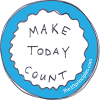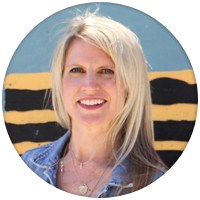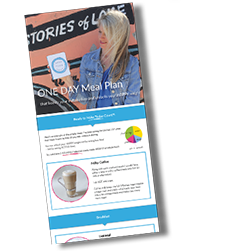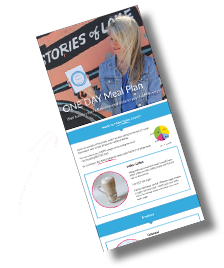
- She Recovers helped me do something I’d waited almost 30 years to do!
- Claire Freeman & Barb Tatham share how LIFE-CHANGING it is to Recover Together
- YOU’RE INVITED!! to the She Recovers Creating Connections Tour
Twenty years ago I recovered from BULIMIA.
On April 28th, 1999—just a couple weeks before I finished Teacher’s College, I broke the pattern of starving, binging, purging and then doing something symbolic to mark the start of a new diet.

Sometimes it was a cheerleader-y gesture… like buying a silver ring (that I’d feel guilty about). But more often than not I’d punish myself for what I thought was a lack of discipline.
Like when I was 14, if I thought I ate even one bite too many, I wouldn’t let myself pat our family dog, Casey, for the rest of the day. (In reality I was hardly eating anything and crazily over-exercising.) As I got older it became more self-destructive. Like I’d purposely not hand-in an assignment worth a big chunk of my overall grade, and it escalated from there… Once I threw out all my belongings.
I was always finding new ways to raise the stakes so there would be more pressure to follow my next diet P-E-R-F-E-C-T-L-Y.
It was a vicious, time-consuming cycle that I’d whirled around since grade 9.

My recovery was full of secrecy, shame and a fight to find a way out
Looking back I can’t believe it took nearly 3 decades before I spoke to someone with even a similar experience.
The first time I didn’t feel so alone, was in a bathroom stall. On the back of an orange door, thick Sharpie letters spelled out: You can get over your eating disorder if you ask for help.
I coped with stress by having every possible eating disorder from the time I was nine years old. I have weighed as much as 160 pounds and as little as 93. When I was a kid, I overate constantly. My weight distressed my mother and she took me to a doctor who put me on Dexedrine diet pills when I was ten years old.— Gilda Radner, comedianThe next time was when I read Gilda Radner’s biography, It’s Always Something.
Years later I came across Jen McNeely’s blog: She Does The City: An imperfect life guide for women. Jen wrote a series of posts about becoming sober. And there were so many parallels between her story and mine.
…Finally I found someone who understood some of the difficult places I’d been.
Although I’d never met Jen, I felt connected.
Then I found She Recovers…
She Does The City had their 10 year anniversary in November 2017. To celebrate, Jen held a weekend of activities in Toronto. It included everything from a macramé workshop to Sex & Stand-Up Comedy to raising a generous donation in support of local women via the United Way.
The Friday event focused on recovery. And Jen invited anyone who was recovering from something.
That night I listened to a panel of true leaders; women recovering out loud to help others.
The first speaker was Taryn Strong, who along with her mother Dawn Nickel, co-founded She Recovers: An international movement of (self-identified) women seeking or in recovery from a wide variety of issues.
Over 275, 000 women have joined this world-wide community in just a couple of years.
We recover from alcohol and substance use disorder, codependency, love and sex addiction, disordered eating and eating disorders, workaholism and perfectionism. We recover from depression and other mental illness, burnout, anxiety, stress, trauma, grief, physical and sexual abuse, self-harm, cancer and chronic illness. We recover from having our hearts broken, from losing our marriages, our homes, or our jobs. Women who are recovering in all areas of their lives and who follow all pathways of recovery are warmly welcomed in She Recovers—a space for women to connect, support and empower one another.
– She Recovers
After hearing each woman’s road to recovery, we were invited to stay and share some of our stories. Then Jen passed around a clipboard so anyone who wanted to meet again could leave their contact information.
…Soon we were getting together every Friday night, and became the She Recovers Together meet-up in Toronto.

What’s a She Recovers meet-up like?
 Each meeting welcomes women of all ages, who are at different stages of recovery from a wide range of experiences. But what everyone has in common is a deep respect for what others are going through. There’s also the chance to share information and encourage others. And what might surprise you is there’s ALWAYS a lot of laughter.
Each meeting welcomes women of all ages, who are at different stages of recovery from a wide range of experiences. But what everyone has in common is a deep respect for what others are going through. There’s also the chance to share information and encourage others. And what might surprise you is there’s ALWAYS a lot of laughter.
Somehow as we grow up, we’re taught to airbrush our lives and hide the parts that aren’t perfect… The parts that are REAL.
Why?!
People are the most interesting, attractive, funny and create the biggest ripples of change, when they’re open and honest. And that’s why I love She Recovers.
Deep relationships form quickly when people feel safe to share.
 We’re all full of cracks. But it’s the experiences that try to break us that make us the most beautiful, if we learn from them and share what we’ve learned. Highlight rather than hide what’s made YOU! In Japan broken pottery is repaired with a lacquer that’s dusted with gold powder. Seams of gold emphasize the fractures instead of disguising them. This art of fixing originates from the Japanese feeling of “mottainai” (regret when something is wasted) and “mushin” (the acceptance of change). I challenge you to expose one of the seams that bind you together. Talk to someone you trust. Sharing is repairing. (Wish that didn’t rhyme!)
We’re all full of cracks. But it’s the experiences that try to break us that make us the most beautiful, if we learn from them and share what we’ve learned. Highlight rather than hide what’s made YOU! In Japan broken pottery is repaired with a lacquer that’s dusted with gold powder. Seams of gold emphasize the fractures instead of disguising them. This art of fixing originates from the Japanese feeling of “mottainai” (regret when something is wasted) and “mushin” (the acceptance of change). I challenge you to expose one of the seams that bind you together. Talk to someone you trust. Sharing is repairing. (Wish that didn’t rhyme!)I’m proud to be part of She Recovers
There’s so much stigma and misinformation out there about recovery. It drives people into isolation where they’re left to reinvent the wheel.
It’s about time recovery was understood.
Recovery isn’t just the chance to get healthy. It’s an opportunity to THRIVE. Not in spite of your challenge. But because of it.

I’m no longer secretive or ashamed of my story
But it took too long to get here.
My Recovery Timeline
From the start of my eating disorder it took:
6 years to ask for help (& find out I have OCD; this diagnosis was a HUGE relief)
10 years to get healthy
(1989 to 1999)
Then after I got healthy it was:
4 years before I told partner about my eating disorder
7 years before I felt comfortable eating higher-fat foods regularly, like avocados (because I still didn’t understand how our bodies work)
13 years before I openly talked about my eating disorder (to share how I got healthy via my blog)
16 years before I put my face on my blog
18 years before I got to speak to someone who had a similar experience – Thanks to She Recovers!
(1999 to 2017)
After I overcame bulimia, I spent years full of regret
I’d been so preoccupied by my eating disorder, that once I got healthy I had no idea how to re-enter my life.
All the things I LOVED—sports, school, anything social, clubs and stuff that’s creative… I hadn’t done in years.
At 24 years old, I had no idea what I was interested in. Or more urgently, what I wanted to do with my life.
I kept thinking about how EVERYTHING would have been different, if I hadn’t had an eating disorder.
Everything will be okay in the end. If it's not okay, it's not the end.— John Lennon, musician
…Eventually my life regained momentum.
Looking back, the key was not finding the PERFECT place to restart, but just starting. Just getting involved and letting life evolve—naturally and unexpectedly, one day at a time. That’s when the magic happens!

A couple years ago something unexpected happened
It suddenly occurred to me that if you gave me a button that could remove my eating disorder from my life, I wouldn’t push it.
Too many good things have come from it.
Having an unforeseen obstacle that rerouted my life was THE BEST education I could’ve had about empathy, hope, love, being resourceful and believing in yourself.
And I learned so many things you just cannot get from a text book.
Or by winning a mountain of trophies.
Or always being told you’re A-M-A-Z-I-N-G.
You just figure out so much more about yourself, the world and what REALLY matters to you, when things aren’t going your way.
And I’m not alone.
Another parallel I see in recovery is how enriched people’s lives become
Or as I like to say, all the sh*t you go through, is fertilizer for the future.
…Now I know my eating disorder didn’t ruin my life.
It made me a better person than I would have been and my life more meaningful.
When Alanis Morissette came out with the song “Thank U (India)” I always changed the words (in my head) to “Thank you eating disorder”.

My eating disorder taught me to:
1. Try to understand rather than judge
For years I didn’t even get what was going on in my life, how could I begin to know what someone else is experiencing?
2. Be passionate, not a perfectionist
After you’ve climbed out of a dark spot you’re not afraid to fail. So you’re willing to get outside your comfort zone—which keeps you evolving.
3. Reach goals
For years I thought asking for help was “giving up.” Now I know talking to others gives you quick access to all kinds of hard-won information you can patch together, to create a plan that works for you. Being smart isn’t having all the answers. It’s building on other people’s successes and then sharing what you’ve learned. We don’t have a lot of time on this planet. The faster you get healthy, the sooner you can get back to your expertise and use it to help others.
4. Find purpose
I resigned from teaching after developing and piloting The Who Is NOBODY? Program. This kit helps people figure out their interests, use them to help others and value themselves for their ACTIONS. Once this resource was up and running I was ready to do my own Who Is NOBODY? project. So I started blogging about how I overcame bulimia. Both these prevention projects make all the difficult things I’ve been through worth it. And neither would have happened had I carried on as a shy, straight A student with everything going to plan. Lasting happiness comes from building your life around your interests.
And there are hundred’s of other things I learned… but the BIGGEST upside of my recovery is that:
5. I HATE WASTE
I learned first hand that a little love can make things BETTER than “new”. Most of my clothes and belongings are second hand. My partner, Alex and I have brought home and fallen in love with many animals from shelters. And since we first met we’ve always wanted to adopt kids. For me, nothing could be more rewarding than giving someone FULL of potential, a chance.

My eating disorder made my life work out in ways my PERFECT plan would have failed.
I just wish I could have been part of a group like She Recovers
She Recovers would’ve sped up my recovery process.
When people RECOVER TOGETHER they can:
- CONNECT with others.
- OPEN UP about their experience, so they can start to understand, accept, address, heal and become stronger because of it.
- RECOGNIZE all the good that comes from recovery and support others.
Recovering together gets you on track and creates a community full of possibilities.
Thanks to heroes like She Recovers co-founders Taryn Strong and Dawn Nickel who’ve mobilized an army of big-hearted women attending She Recovers around the world… the chance to CONNECT, OPEN UP and RECOGNIZE the opportunity in recovery is MUCH MORE accessible.

The POWER of recovering together
Since opening up about my recovery, I’ve had the chance to connect with some BIG souls.
The two most important days in your life are the day you are born and the day you find out why.— Mark Twain, WriterAnd I’ve asked them to share their experience of recovering together.
So many surprising things develop during a difficult time—especially when we band together. And they often continue to be an important part of our lives.
Recovering Together: Claire

INTRODUCING:
Claire Freeman, Christchurch, New Zealand
PASSION:
PhD in Health Science
Advocate for changing the assisted suicide bill
& Active social media presence to share the new skills and adaptations that come from being physically impaired
CHALLENGE:
I have a C5/6 level spinal cord injury; this means that I can’t walk and have only some movement in my arms.
Claire’s Recovering Together Story:
When I was 17 years old my mother fell asleep at the wheel. Luckily, she wasn’t badly hurt, however, my prognosis was fairly grim. I sustained a cervical spinal cord injury that left me paralyzed from my chest down. Doctors told me that I’d never walk again, wouldn’t use my hands and my dream career as a designer would only ever be a dream.
Not being one to give up, I completed my design degree in spite of having no finger function, and went on to become a successful designer.

Three years ago, I needed neck stabilizing surgery from my original neck break. The surgery was a disaster due to the surgeon placing a screw into my spine. I lost significantly more arm movement as a result. This time, I knew my career as a designer would be impossible.
However, as someone who understands loss and see’s potential, I embraced a new dream. So I began studying towards a PhD in health science while finally working on my terrible self-esteem issues regarding my disabled body.
I will admit initially I was very depressed. And I was looking into things like assisted suicide to end my suffering. I discovered that because it was performed and vetted through the medical system, it made suicide ‘socially acceptable.’ So all of my family and friends supported my decision and didn’t question me.
Except one.
While having dinner with a few friends including Cindy, who I’m very close to, I started discussing my ‘last plans’. She interrogated me as to why I wanted and needed the ‘end of life intervention’. Although we had a fairly heated discussion, she planted a seed of doubt in my mind.
Her talk that evening started a chain reaction of thoughts that led to my dismissal of my assisted suicide plans.
Alternatively I started asking questions as to why it was acceptable for someone like myself to qualify for assisted suicide. I’d seen numerous health professionals, in yet no one had stopped to question my life coping skills or to offer support (which currently is not provided for people like ourselves because of our disabilities). Instead they assumed: Who could ever live with paralysis?—to quote what a psychologist said to me at the suicide outreach clinic, after I’d had a failed attempt that landed me in a coma for a week.
I'm now vocal about teaching the world that even if you have an illness or impairment, have been through trauma or have mental health issues, you add value.— Claire FreemanNow I’m an advocate for changing the assisted suicide bill and including NZ’s indigenous voice within the Bill. Recently I went to our capital city to speak with Ministers of Parliament to ask for support to be provided—not assisted suicide—during dark moments.
Another turning point for me, was seeing a random TED talk on YouTube with a girl called Claire Wineland (she’s sadly passed away due to Cystic Fibrosis). She put suffering and disability in completely new context for me, and for the first time, I saw my impairment differently. I was a survivor, who had learnt so many new skills because of my disability. I no longer hated it and myself but re-envisaged my disability as something that was of value. This meant I was of value, a concept I’d never experienced as I’d always assumed I was a burden.
So I created an online presence and am now vocal about teaching the world that even if you have an illness or impairment, have been through trauma or have mental health issues, the great thing about being human is that we can adapt. We often become creative, compassionate and patient – all skills I see as being of value to our world. Our insights into suffering are also what makes us special. I have learnt to love myself again, through sharing my story, being open and honest about the good and bad parts of life, and promoting kindness and love.
Much love and arohanui and thank you for sharing my story,
Claire
 @claire.freeman.nz
@claire.freeman.nz
 https://www.freemansblog.net/
https://www.freemansblog.net/
 Overcoming a Spinal Cord Injury: Claire’s Story
Overcoming a Spinal Cord Injury: Claire’s Story
 Tetraplegic Model In Milan
Tetraplegic Model In Milan
She Recovers: Barb

INTRODUCING:
Barbara Tatham, Toronto, Canada
PASSION:
Emergency Physician with a fellowship in Emergency Department Ultrasound
& started a nonprofit organization called EM Global that trains emergency physicians in Tanzania
Writing a book about her experience to help others
CHALLENGE:
After 13 years of post-secondary education with a fellowship in Emergency Department Ultrasound I was offered a position with the University Health Network. Before starting, I was going to spend a month teaching Tanzanian doctors how to incorporate the ultrasound equipment I’d organized to be donated to their emergency practice. I never made it to Tanzania, and I never started work in Toronto. Instead of walking through those doors as a physician, I was a patient. I had a high grade cancerous sarcoma tumour that destroyed my skull and was pushing on my brain. Over the last year, I’ve undergone aggressive chemotherapy, radiation, had multiple 10 hour surgeries and ICU stays.
Barb’s Recovering Together Story:
Through this experience I’ve learned that we often keep our challenges to ourselves, sharing only with those closest in our lives, as if our illness is something vulnerable needing protection. Or as though it redefines who we are. We shield it from others so it won’t change how people see us, or more importantly, how we see ourselves.
These choices are often influenced by the stigma we hold and then project onto others.
Isolating our experience disconnects us from people when we need them the most. And isolation creates so much heart ache.
But when we go through it together, we’re so much stronger.
The way I see myself and my future is continually changing. Acknowledging disease and talking about my joy and pain with others has allowed me to find some meaning. Being open has contributed to finding peace with the unknowns in diagnosis and treatment, and my changing body and disrupted life.
Sharing has been a vehicle to make sense of it all even when there is no sense to be made.
Sharing has been a vehicle to make sense of it all even when there is no sense to be made... Whether it's Crohns, cancer, mental health, or any other illness or struggle we face, we're not alone.— Barbara TathamMy illness is not special. As an emergency physician I see people become sick every day. There is no why, there is no reason. I choose to embrace the illness and make it part of my story—rather than it being my story.
Talking about my experience has been powerful because I’ve had so many people reach out with their own stories. Often they’re strangers who are opening up for the first time.
Whether it’s Crohns, cancer, mental health, or any other illness or struggle we face, we’re not alone.
Connection makes life so beautiful. I think about all the people in my own life, and beyond, whose lives are completely altered by facing their own battles.
Cancer will take away your old normal, change the way you live your day to day, alter your physical body, cause pain, make everything more challenging, and worse… but it can’t take away who you are.
I’ve made so many new connections with people, and dove deeper into some of the relationships I already had, just by leaning on others and being there for others to lean on.
I met a young woman 10 months ago as we were both trying on hats to cover our newly bald heads. She was alone, in that moment, and in her fight. We got silly and modeled in the mirror and got matching beanies. I told her whenever she felt alone she knew her beanie mate would be thinking of her. We still talk today.
Fear is a shared human experience, but through the challenges we develop strength and in sharing our pain our relationships also find strength.
I believe finding peace and alignment doesn’t mean we’re perfect or that we have our shit together all the time. It doesn’t mean we don’t cry, or don’t get angry, or don’t struggle.
It means we can handle doing all these things because we know that afterwards our hearts will be even more full.
Make waves, be kind to people. And laugh,
Barb
Learn more about Barb’s Nonprofit Organization: EM Global.
***Devastating Update with POWERFUL message. Please listen:
My EM colleague, friend, collaborator, an inspiration to us all, the spokeswoman of our time bringing #physiciancompassion to the forefront, Barbara Tatham died today.
These 4 mins of her speaking are the most important podcast minutes in EM Cases history.https://t.co/ykkK9RYv4z pic.twitter.com/h69nIA1C0U— Anton Helman (@EMCases) October 17, 2019
Make Today Count
 For years I was ashamed of my disordered eating and thought it ruined my life. I always wondered what it would have been like, if I hadn’t spent the ages of 14 to 24 preoccupied by a complicated relationship with food due to my underlying issue OCD. Fast-forward 20 years and I can’t IMAGINE my life without this chapter. So many lessons, magical moments and beautiful people have come from this experience and enriched my life; it was an education I couldn’t have had any other way.
For years I was ashamed of my disordered eating and thought it ruined my life. I always wondered what it would have been like, if I hadn’t spent the ages of 14 to 24 preoccupied by a complicated relationship with food due to my underlying issue OCD. Fast-forward 20 years and I can’t IMAGINE my life without this chapter. So many lessons, magical moments and beautiful people have come from this experience and enriched my life; it was an education I couldn’t have had any other way.

What bridged the gap between despair and being healthy? Talking… It doesn’t have to be the perfect person. Just think of someone you trust. Then you can work out what to do next, together. When you share what your typical day is like, it opens a world of possibility to patchwork your recovery and get back to life BETTER.
Who can you speak to? If you’re more comfortable explaining what you’re going through in a letter, that’s a great start too. Nothing’s more important than your mental health. And there’s no better time to start than TODAY.
Pick up the phone or grab a pen. xo

Next Steps
Want to learn more about She Recovers? Check out their website. It’s full of RESOURCES—from Facebook Groups (there’s the main She Recovers Together Facebook Group and also She Recovers Together Facebook Groups for each local area as they get involved) to Recovery Retreats to the She Recovers Podcast!
She Recovers is also doing a Creating Connections Tour. They’re visiting cities across North America and YOU’RE INVITED! The first event was in Chicago. This weekend (Sunday, June 9, 2019) Toronto will participate. Then it’s:
Nashville: August 3rd
Seattle: September 14th
New York City: October 12th
San Diego: November 9th
Here’s all the details about the She Recovers Creating Connections Tour. Please share with anyone who might be interested about this movement. Every age and experience is welcome. xo
I regularly blog about how I stopped dieting obsessively and lost weight for good by making SIMPLE and HEALTHY choices. Sign up (below) and you’ll get the first step I took to get healthy.
This song was written for Chesley Sullenberger (“Sully”), the pilot who landed the US Airways Flight 1549 in the Hudson River off Manhattan. He saved all 155 passengers. I’m dedicating “A Real Hero” to Taryn Strong, Dawn Nickel and to anyone interested in this movement. We’re all pilots navigating a difficult course. She Recovers offers the chance to see a map, discuss and reroute. And for that, 275 000+ of us (and counting!) would like to say: Thank you.
Do you have a recovery story?
Please share in the comments below.
It could be about:
- physical and sexual abuse
- self-harm
- perfectionism
- depression and other mental illness
- codependency
- love and sex addiction
- chronic illness
- cancer
- broken hearts
- alcohol and substance use disorder
- disordered eating and eating disorders
- workaholism
- anxiety
- stress
- trauma
- grief
- burnout
- losing marriages, homes, or jobs

 These kinds of meals and snacks unlocked my HAPPY weight 21+ years ago (I lost 30 pounds without dieting!)
These kinds of meals and snacks unlocked my HAPPY weight 21+ years ago (I lost 30 pounds without dieting!)
You'll also be subscribed to my newsletter. Don’t like it? Unsubscribe in one click

 These kinds of meals and snacks unlocked my HAPPY weight 21+ years ago (I lost 30 pounds without dieting!)
These kinds of meals and snacks unlocked my HAPPY weight 21+ years ago (I lost 30 pounds without dieting!)
You'll also be subscribed to my newsletter. Don’t like it? Unsubscribe in one click




Sharing what I learned makes the 10 years I STRUGGLED worth it






Leave A Comment